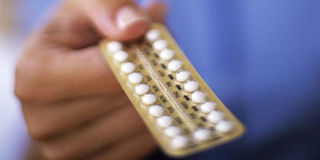Stop popping banned Chinese contraceptive pill, ministry warns

The drug, Sophia, was banned in Kenya 10 years ago, but has since found its way into the market, touted as a natural herbal product.
What you need to know:
- The Ministry warns there does not exist a family planning method where one takes a pill once a month.
Kenyan women have been warned against using a banned Chinese oral contraceptive pill as it is harmful to their health.
Dr Albert Ndwiga, the manager of the Ministry of Health’s National Family Planning Programme, said there does not exist a family planning method where you take a pill once a month.
“If you see somebody distributing these kinds of pills, please warn them; they are very dangerous. They have severe side effects even on unborn children. They are sold as Chinese herbal medicines,” he warned, adding that half of the women using the method end up getting pregnant.
The drug, Sophia, was banned in Kenya 10 years ago, but has since made its way back into the market, touted as a natural herbal product with no side effects.
However, samples collected and tested by the Ministry of Health showed that the product is toxic and has severe impact on the user.
Results from analysis done by the National Quality Control Laboratory that led to the banning of the pill 10 years ago found it had abnormally high levels of the hormones levonorgestrel and quinestrol, the active ingredients in conventional contraceptive pills.
From the results issued by the Pharmacy and Poisons Board, the pill contains 40 times the recommended level of levonorgestrel and quinestrol.
Also, the pills contained as much as 3000mcg of estradiol, 100 times more than the recommended dosage. The recommended daily pill contains 30mcg. The results found varying amounts of the active ingredients with some pills being of no value.
Excess estradiol, which is an analogue of oestrogen, poses the risk of blood clots and heart disease.
Effects
Children born to women who have been on this pill present with early breast and uterus enlargement and develop to men faster for the males.
Babies who are breastfeeding are also exposed to the chemicals in the drug and carry the risk of developing secondary sexual features.
“When the pill fails and a woman gets pregnant, the children born will experience effects. They start developing secondary sexual characteristics at a very early age,” said Dr Ndwiga.
He was speaking to the media ahead of the World Contraceptive Day on Monday. The theme of this year’s celebration is, “Breaking Myths and Misconceptions on Family Planning”.
Dr Bashir Issak, the head of the ministry’s Department of Family Health, urged women to use approved and registered contraceptive methods.
“You may think it is swallowed once a month and easy to take, but the impacts are too huge to deal with in the long run,” he said.
He expressed concern that the pill is back in the country years after it was banned.
The Pharmacy and Poisons Board in 2008 banned the pill in the Kenyan market, conducted post-market surveillance in 2014, and withdrew all the pills in the market.
“We banned this drug. If they are still in the market then our team will work on it,” Dr Fred Siyoi, the board’s chief executive officer, said.
According to marketing literature, the pill, which is designed to resist immediate attack by stomach acids, remains in the stomach for weeks, slowly releasing hormones to prevent pregnancy.





